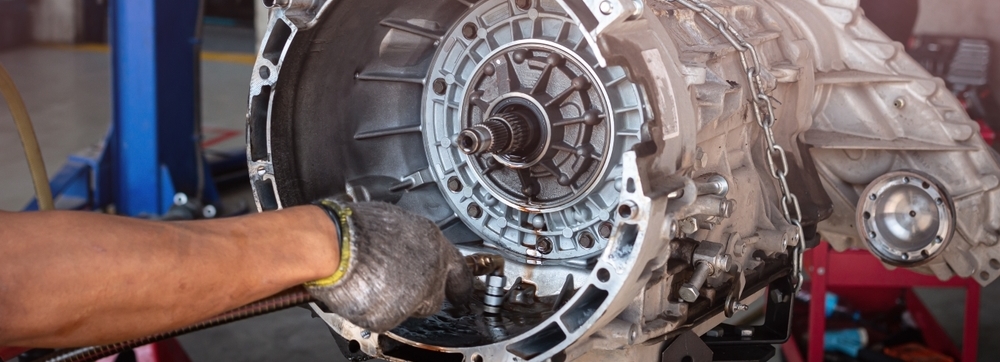 No one enjoys experiencing car trouble, especially when unexpected noises or smells disrupt a busy day driving around town. Performing routine maintenance on your vehicle’s auto transmission system often prevents common problems. However, sudden gear slipping may indicate a faulty shift solenoid or other issue and must be inspected by a qualified service technician.
No one enjoys experiencing car trouble, especially when unexpected noises or smells disrupt a busy day driving around town. Performing routine maintenance on your vehicle’s auto transmission system often prevents common problems. However, sudden gear slipping may indicate a faulty shift solenoid or other issue and must be inspected by a qualified service technician.
Common Auto Transmission Problems
Vehicle mechanical problems (unlike electrical problems) often have distinct sounds, smells, and motions that indicate malfunctions. Auto transmissions are constantly used during acceleration and deceleration, so they can wear down over time. Since transmission repairs can be expensive, it’s important to notice changes in your vehicle’s performance. These may include drive comfort and any new smells or noises. Here are some common auto transmission issues that can become problems if unaddressed:
- Burning smell
- Car will not go into gear
- Check Engine or Transmission dashboard light is on
- Gears slip
- Leaking transmission fluid
- Manual clutch doesn’t engage
- Noises: whines, thuds, or grinds when changing gears (or in neutral)
- Slow response when changing gears
- Vehicle shaking
Dashboard Warning Lights
Your car’s transmission system has several electronic sensors that detect unusual activity in the system. These sensors inform the central computer if something is wrong, and the appropriate warning light turns on. Some cars have a Check Engine light and a different warning light for the transmission. If one or both lights are on, schedule a diagnostic service to identify the cause.
Dragging Clutch
A properly functioning transmission should shift smoothly into the correct gear. If there is a notable delay while shifting into gear, several of its components may be the cause. In a manual transmission, a dragging clutch won’t disengage the clutch from the flywheel when pushing the clutch pedal. This results in grinding noises when trying to shift gears.
Gear Slipping
Gear slipping is an easy problem to identify with your vehicle’s transmission system. With a functioning transmission, the car stays in gear until you initiate a gear shift. With a malfunctioning one, the car can unexpectedly drop out of gear while driving and put the vehicle into neutral.
- Vehicles with a manual transmission often have grinding when shifting gears.
- Automatic transmissions may cause the car to shake when shifting gears, with more harsh transitions going into the higher gears.
You can tell when it slips if the engine revs while shifting, but it feels like you are driving over ice. Gear slipping is unnerving and potentially dangerous, requiring an immediate diagnostic service.
Leaking Transmission Fluid
A burning, sweet smell may indicate your transmission is overheating. Transmission fluid lubricates the components and prevents them from overheating. A little fluid puddle on your driveway can quickly become a significant problem. Auto transmission fluid is usually bright red, translucent, and somewhat sweet-smelling. Your vehicle’s transmission fluid may burn if it’s too low, indicating a leak or dirty fluid that needs changing.
Slow or Stuttering Acceleration
Transmission problems can manifest as surging, jerking, or stuttering motions while changing gears and pressing the gas. You may also hear and feel a clunk or thud while your vehicle struggles to accelerate.
Sudden Deceleration or Stalling
Sudden deceleration or acceleration can indicate serious transmission problems in your car. When a vehicle’s engine surges, you will notice it is speeding up or slowing down despite consistent pressure on the accelerator. The RPMs will also fluctuate. A surging transmission can cause a car to lurch forward and fall backward while driving, in neutral, or in park.
Stalling vehicles that suddenly restart may have transmission line issues. The torque converter may not engage and disengage correctly, making it slip and the car stall.
Vehicle Shaking
Vehicles with defective transmission systems may shake or shudder when shifting at higher speeds. The shaking may intensify when transitioning into the next gear. In manual transmissions, vehicle shaking may be accompanied by loud grinding noises when shifting into a different gear.
Common Auto Transmission Repairs
Shifting problems can be caused by solenoid issues, low or dirty transmission fluid, clogged transmission filters, and a defective transmission cooler. Following the factory-suggested routine maintenance schedule can prevent many of these problems. Let’s review a few common auto transmission repairs.
Transmission Fluid
Always follow the manufacturer’s recommended routine maintenance schedule when exchanging or flushing your vehicle’s transmission fluid. Be aware that service intervals vary widely depending on vehicle year, make, and model. Some cars and trucks range from as little as 30,000 miles to over 100,000. Many new automatic vehicles come equipped with sealed transmissions containing fluid meant to last the car’s lifetime. With that being said, old, burnt, or low transmission fluid can cause many transmission problems and should be monitored.
Shift Solenoid
The shift solenoid is an electromagnet transmission component in an automatic or semi-automatic transmission. It controls the flow of transmission fluid necessary to change gears and performs other functions in the transmission. A faulty shift solenoid can trigger dashboard warning lights, cause shifting issues, and activate a safety measure called ‘limp mode.’
Transmission Control Module (TCM)
The Transmission Control Module (TCM) is an electronic control unit responsible for managing and controlling the transmission’s operations. It collects information from the engine and various sensors to calculate when to shift gears. The TCM is critical in gear shifting, ensuring that your vehicle transitions between gears seamlessly. It regulates hydraulic pressure through transmission control solenoids and controls clutch engagement. It also decides when to upshift or downshift based on the driving conditions. A faulty TCM may cause a rougher ride, decreased fuel efficiency, and gear slipping.
Routine Transmission Maintenance
Fisher’s Auto Service offers comprehensive auto transmission services that keep your vehicle running like new. Our ASE Certified and Master mechanics can handle all your auto transmission service needs, including diagnosing gear slipping, shift solenoid replacement, and routine maintenance.
Make An Appointment For Service
Call us at (425)441-3626 or visit our website to schedule your routine maintenance transmission service today!

